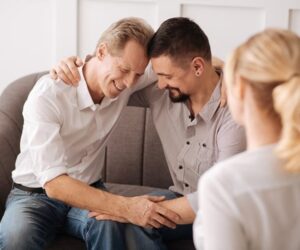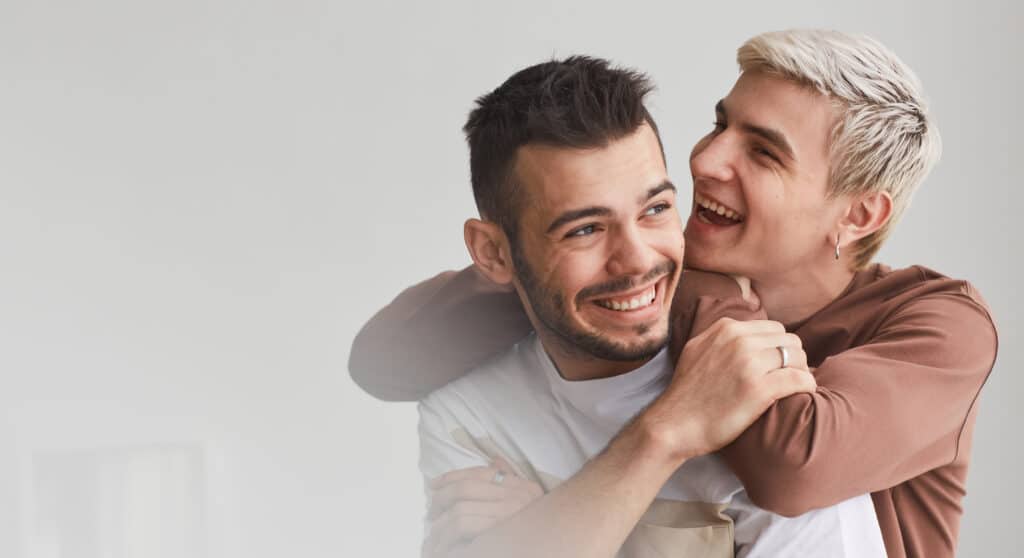Understanding and acknowledging the unique dynamics and challenges of same-sex relationships is vital in today’s society. As the world continues to move towards acceptance and inclusivity, the importance of specialized counseling for gay couples has emerged at the forefront. This blog post will delve into the nuances of gay couples counseling, providing insights, helpful tips, and resources. Regardless of where you are in your relationship – just beginning, long-term, facing struggles, or just looking to strengthen your bond – this guide aims to offer valuable insights to make your journey smoother and more enriching.
Contents
What Is The Need For Specialized Gay Couples Counseling?
 While all couples may face common relationship challenges, gay couples often face additional unique hurdles stemming from societal attitudes, legal barriers, family reactions, and internalized homophobia, among others. Thus, specialized gay couples counseling is essential for several reasons:
While all couples may face common relationship challenges, gay couples often face additional unique hurdles stemming from societal attitudes, legal barriers, family reactions, and internalized homophobia, among others. Thus, specialized gay couples counseling is essential for several reasons:
- Understanding Specific Challenges
Gay couples may face issues that are unique or more prevalent in their relationships due to the societal context in which they exist. This could include coping with discrimination or stigma, coming out to family and friends, dealing with internalized negative beliefs or reconciling religious beliefs with sexual orientation. A specialized counselor can help couples navigate these issues more effectively because they are familiar with these unique challenges.
- Cultural Competency
Therapists who specialize in gay couples counseling are usually more aware of and sensitive to the cultural nuances and issues specific to the LGBTQ+ community. They are better equipped to create a safe, understanding, and inclusive space where couples feel validated and understood.
- Normalization and Validation
In a world where heteronormative relationships are the norm, gay couples can sometimes feel isolated or different. A specialized counselor can provide validation of their experiences and feelings. Eventually, helping to normalize their experiences and reduce feelings of isolation or stigma.
- Improved Communication
Some issues, like coming out or dealing with discrimination, can be hard to talk about. Specialized counselors can help improve communication about these complex issues, fostering a better understanding between partners.
- Dealing with Family Dynamics
Many gay couples face challenges with family acceptance. A specialized counselor can guide navigating these complicated dynamics while maintaining the integrity and health of the relationship.
Overall, the need for specialized gay couples counseling is driven by the unique experiences, challenges, and cultural dynamics that gay couples encounter in their relationships. An understanding and knowledgeable therapist can offer invaluable support in navigating these situations.
How Does Gay Couples Counseling Conducted?
Gay couples counseling, much like any form of couples counseling, is conducted with the goal of fostering healthier relationships. Here’s an overview of how it is typically conducted:
1. Intake and Assessment
The therapy process usually starts with an intake session, where the therapist gets to know the couple, their history, the issues they’re facing, and their goals for therapy. This is a crucial step as it helps the therapist tailor the therapy process to the couple’s unique needs.
2. Establishing a Safe and Inclusive Environment
It’s important for therapists to establish a non-judgmental, safe, and inclusive therapeutic environment. This helps the couple feel comfortable expressing their thoughts, feelings, and experiences.
3. Addressing Unique Challenges
Given the societal and cultural context, gay couples often face unique challenges. Therapists may focus on helping the couple navigate issues such as discrimination, coming out, dealing with family reactions, or internalized homophobia.
4. Strengthening the Relationship
Counseling isn’t just about resolving issues; it’s also about strengthening the relationship. The therapist may work with the couple on deepening their emotional connection, fostering greater understanding, and building shared goals and values.
5. Ending Therapy
Once the couple has achieved their goals or made significant progress, the therapist will work with them to create a plan for ending therapy. This usually includes discussing strategies to maintain progress and prevent relapse.
It’s important to note that the exact process can vary depending on the therapist’s theoretical orientation, the specific needs and goals of the couple, and the unique challenges they’re facing.
What Are The Common Techniques Used In This?
 Several therapeutic techniques and modalities are commonly used in gay couples counseling. The choice of techniques depends on the specific needs of the couple, their goals for therapy, and the therapist’s approach. Here are a few common techniques:
Several therapeutic techniques and modalities are commonly used in gay couples counseling. The choice of techniques depends on the specific needs of the couple, their goals for therapy, and the therapist’s approach. Here are a few common techniques:
Cognitive-Behavioral Therapy (CBT)
This approach helps couples understand how their thoughts, feelings, and behaviors are interconnected. It teaches them to challenge and change negative thought patterns, which can improve emotional responses and behaviors in the relationship.
Emotionally Focused Therapy (EFT)
EFT is designed to help couples understand and reorganize their emotional responses to strengthen their bond. It helps partners move away from patterns of blame and disconnection and toward patterns of expressing and addressing underlying needs and emotions.
Gottman Method
This approach, based on the research of Dr. John Gottman, involves teaching couples specific skills to improve their relationships. Such as effective communication, conflict resolution, and emotional connection. It also emphasizes the importance of building a solid relationship foundation by nurturing admiration and fondness.
Narrative Therapy
This technique encourages couples to reframe the narrative of their relationship, helping them view their challenges in a new light. It can be particularly helpful for couples dealing with issues related to stigma, discrimination, or coming out.
Mindfulness Techniques
Mindfulness can help couples become more aware of their feelings, thoughts, and reactions, promoting a deeper understanding of oneself and one’s partner. This can lead to increased empathy, better communication, and improved conflict resolution.
Assertiveness and Boundary Setting
Counselors may help couples learn to express their needs assertively and set healthy boundaries, crucial skills for maintaining a balanced and respectful relationship.
Remember, the effectiveness of these techniques largely depends on the unique needs of the couple, their willingness to engage in the therapeutic process, and the expertise of the therapist.
How To Find The Right Counselor Near Me?
Finding the right counselor is a crucial part of the therapeutic process. Here are some steps to guide you in your search for the right counselor for gay couples counseling:
- Look for Specialization
Seek a therapist who specializes in LGBTQ+ issues or has substantial experience working with gay couples. This expertise ensures they have a deeper understanding of the unique challenges and dynamics that may be present in your relationship.
- Verify Their Credentials
Make sure the counselor is licensed and has the necessary qualifications to practice couples therapy. Check if they are registered with recognized professional bodies, and if possible, look at their educational background and any additional training they have completed.
- Cultural Competency
Ensure the therapist demonstrates cultural competency and sensitivity to LGBTQ+ issues. They should create a safe, inclusive, non-judgmental space where you and your partner feel understood and accepted.
- Ask for Recommendations
Reach out to local LGBTQ+ organizations for therapist recommendations. You can also ask friends or family if they have any recommendations.
- Consultation
Most therapists offer an initial consultation. Use this opportunity to ask questions and get a feel for whether you could be comfortable with this therapist. It’s important that both you and your partner feel at ease with the therapist.
- Affordability and Insurance
Check the counselor’s rates and see if they match your budget. If you have insurance, verify if the services of the therapist are covered under your plan.
- Location and Mode of Therapy
Depending on your preference, you may opt for face-to-face sessions, or you might prefer online therapy, which offers more flexibility. Choose a counselor who can accommodate your preference.
Remember, it’s perfectly okay to try a few therapists before you find the right fit. Because the most important thing is that you and your partner feel comfortable, understood, and respected.
What Are Some Resources That Can Help?
 There are numerous resources available for gay couples seeking help or guidance, from digital platforms and online communities to local support groups and organizations. Here are some resources, including:
There are numerous resources available for gay couples seeking help or guidance, from digital platforms and online communities to local support groups and organizations. Here are some resources, including:
- MantraCare: MantraCare is a teletherapy service that provides mental health support to individuals and couples. They offer personalized treatment plans for issues like depression, anxiety, and relationship problems. Their experienced therapists can provide support and help you navigate the unique challenges you’re facing as a gay couple.
- CoupleMantra: CoupleMantra is an online platform dedicated to helping couples build stronger relationships. They offer courses, blogs, webinars, and coaching to help couples improve communication, understand each other’s needs, and resolve conflicts. Their resources can be beneficial for all couples, including gay couples.
- PrideMantra: PrideMantra is a safe, supportive community for LGBTQ+ individuals. They provide resources, guidance, and connection to help individuals and couples navigate their journeys. You can find information about coming out, dealing with discrimination, strengthening relationships, and much more.
- Gay Couples Institute: The Gay Couples Institute offers counseling specifically designed for gay couples based on research from the Gottman Institute. They provide both in-person and online counseling services.
- LGBT National Help Center: They offer confidential peer support, information, and local resources for LGBTQ+ individuals and couples.
- Local LGBTQ+ Centers and Organizations: Check for local organizations or centers in your area. These often provide resources, run support groups, and can recommend LGBTQ+-friendly therapists.
Remember, it’s essential to find the resources and support that resonate with your unique needs and experiences. Don’t hesitate to reach out and explore different options to find what works best for you and your relationship.
Conclusion
As we wrap up this journey through the realm of gay couples counseling, it’s important to remember that every relationship, regardless of orientation, faces its unique set of challenges. However, for gay couples, societal attitudes, discrimination, and other distinct factors often contribute to additional hurdles. Hence, specialized counseling becomes a necessity, helping navigate these unique dynamics and fostering stronger, healthier relationships.
Remember, seeking help isn’t a sign of weakness. In fact, it’s a testament to the strength of your commitment to each other and the desire to grow, both as individuals and as a couple. Love is love, after all, and everyone deserves the tools to make it flourish. Life may sometimes be challenging if you are gay, but Online Gay Counseling can help. Get experienced LGBTQ therapists at PrideMantra: Book a trial LGBTQ therapy session


